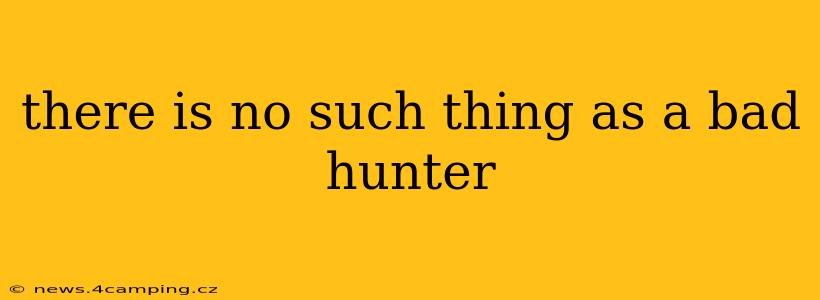There Is No Such Thing As A Bad Hunter: Debunking the Myth and Exploring Hunting Ethics
The statement, "There is no such thing as a bad hunter," is a provocative one, sparking debate within hunting communities and beyond. While it might seem overly simplistic, it highlights a core principle: ethical hunting practices are paramount, and responsible hunters strive for continuous improvement. This doesn't mean there aren't hunters who make mistakes or exhibit poor judgment; rather, it emphasizes the importance of learning, adapting, and upholding a strong ethical code. This article explores this concept, addressing common questions and misconceptions surrounding the idea of "bad" hunters.
What constitutes a "bad" hunter?
This is a critical question, as the definition can be subjective. However, several behaviors consistently point towards unethical or irresponsible hunting:
-
Disregard for safety: This is the most fundamental aspect. A "bad" hunter might neglect safe gun handling practices, disregard the presence of others, or fail to identify their target clearly before shooting. Such negligence puts themselves and others at severe risk.
-
Wastefulness: Failing to properly utilize the harvested animal is a clear sign of irresponsible hunting. This includes leaving meat to spoil, failing to utilize usable parts like hide or antlers, and generally not respecting the animal's sacrifice.
-
Lack of respect for wildlife and habitat: Poaching, hunting out of season, exceeding bag limits, or damaging wildlife habitat are blatant violations of ethical hunting principles. This disrespect towards nature undermines conservation efforts and jeopardizes the future of hunting.
-
Lack of knowledge and skill: While experience improves skills, a lack of basic knowledge about hunting techniques, animal behavior, and regulations is dangerous and irresponsible. This can lead to missed shots, wounding animals, and ultimately, failing to make a clean kill.
-
Unwillingness to learn and improve: The best hunters are those who constantly seek to improve their skills, knowledge, and ethical practices. A hunter who refuses to learn from mistakes or adapt to changing circumstances is unlikely to be a responsible or successful hunter in the long run.
What are the ethical responsibilities of hunters?
Ethical hunting transcends merely adhering to regulations. It involves a deep respect for the animals hunted, the land they inhabit, and the broader hunting community. Key ethical responsibilities include:
-
Following all laws and regulations: This is non-negotiable. Hunters must be fully aware of and comply with all applicable hunting licenses, seasons, bag limits, and other regulations.
-
Ensuring a clean, humane kill: Ethical hunters strive to make a quick, clean, and humane kill, minimizing the animal's suffering. This requires appropriate shot placement, the use of suitable weaponry, and the ability to track and recover wounded animals.
-
Respecting the environment: Hunters should minimize their impact on the environment. This includes proper waste disposal, respecting private property, and avoiding actions that might damage the habitat.
-
Sharing their knowledge and passion: Ethical hunters often share their knowledge and experience with others, fostering a culture of responsible hunting and conservation.
How can hunters improve their skills and ethics?
Continuous learning is crucial for all hunters. This can involve:
-
Taking hunter safety courses: These courses are fundamental and cover essential safety protocols.
-
Seeking mentorship from experienced hunters: Learning from experienced hunters can accelerate skill development and instill strong ethical practices.
-
Practicing regularly: Regular practice improves shooting accuracy, tracking skills, and other essential abilities.
-
Staying updated on regulations and best practices: Hunting regulations and best practices can change, so it's essential to stay informed.
-
Participating in conservation efforts: Supporting conservation initiatives demonstrates a commitment to the long-term sustainability of hunting and wildlife.
In conclusion, while the statement "There is no such thing as a bad hunter" might be interpreted as overly forgiving, it underscores the importance of ethical hunting and continuous self-improvement. The focus should always be on responsible hunting practices, respect for wildlife, and a commitment to conservation. Hunters who strive for these ideals are contributing to the long-term sustainability of hunting and the preservation of our natural resources. Those who fall short need to be held accountable and encouraged to learn and improve their skills and ethics.
